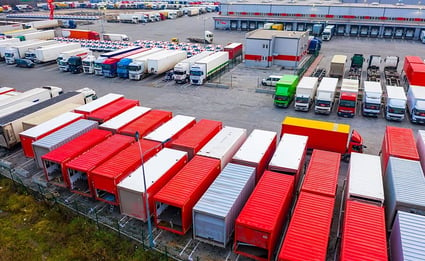6 Key Things You Should Consider When Picking a Freight Carrier
Martin Pahulje - October 12, 2021

Establishing a strong relationship with an experienced freight carrier is the first step towards achieving an efficient transportation system. The freight carrier you choose can make or break the success of your organization. If you select the wrong carrier, your organization may face increased costs, delayed shipments, and unsatisfied customers – so this decision is critical. Most manufacturers recognize the importance of selecting the right carrier, but they don't know where to start. With countless potential providers offering varying services, this decision can be daunting. Consider these six factors to ensure that you choose a freight carrier that will meet your needs and cultivate an efficient transportation system.
1. Transparent Pricing
When picking a freight carrier, price is likely one of the most significant determining factors. Finding the right price point for your carrier can be a bit of a balancing act. While high-quality carriers may be expensive, it is important that you do not overpay a provider when competitors offer the same services for less. On the other hand, if a provider is unusually inexpensive, consider that they may not provide all of the services you need. Transportation logistics costs can be high, so you must ensure that your carrier’s fees are worth their services.
It is also vital that the freight carrier you choose has a transparent pricing structure. With any carrier, you will experience additional fees based upon your specific needs, but these fees should be transparent and explicitly disclosed. If this is not the case, you may experience unexpected expenses lumped together with your typical costs, such as fuel surcharges or brokerage fees. Depending on how ambiguous pricing is, you may not even be aware that you are incurring additional expenses.
2. Services Offered
Another crucial feature to inquire of when choosing a carrier is the services offered. Before speaking with a carrier, determine what services your business requires from the ideal carrier. Once this is established, compare your list to the transportation services provided by a potential carrier. It may be feasible for one provider to satisfy all of your organization's needs, but it is possible that you will need to work with multiple carriers to move your freight.
Beyond the services they offer, it is important to determine the capacity that a carrier can handle with their equipment. Due to current supply chain shortages, the demand for transportation services significantly exceeds the current supply. As a result, carrier capacity is challenging to obtain in the amount that manufacturers need. Discuss with the potential carrier how much capacity they can handle and ensure that this matches the load you need to move.
In addition to capacity, determine if this carrier owns its own fleet of trucks and trailers and reliable warehouse space for your goods. If equipment is outsourced, how strong is the relationship between the carrier and their provider? If problems arise, your company will face the repercussions and be left without adequate storage and transportation.
3. Technical Capabilities
Today, there are countless technologies used by companies in the transportation industry to optimize shipping and moving goods. If your carrier utilizes transportation optimization software, they will have enhanced insight into routing and scheduling solutions, in addition to real-time monitoring capabilities. This software also has prescriptive analytics capabilities, enabling carriers to identify areas of waste and inefficiency, ensuring that their transportation is as efficient as possible.
With this technology, your carrier can better manage their freight, ensuring that they transport goods with the most optimal methods. This will ensure that capacity is utilized to the fullest while avoiding delays and ensuring the timely arrival of your shipments.
4. Reputation & Experience
Once you choose a carrier, your reputation will be tied to their services. If your carrier fails to move your products in a safe and timely manner, your customers will be left dissatisfied, damaging your reputation. For this reason, it is critical that the carrier you choose maintains a positive reputation. To determine this, you can check if the carrier is an approved member of the World Cargo Alliance. Additionally, asking your carrier for a list of references can be beneficial in determining if they provided inadequate services in the past.
Hand-in-hand with reputation is experience. The carrier you choose must have adequate industry experience. The level of experience they have can disclose how well they are prepared to interact with your company and customers, in addition to handling issues. As supply chain delays from the pandemic and Suez Canal blockage are still prevalent, ensuring that your carrier can handle unexpected problems is critical. It can be helpful to inquire how your carrier typically handles issues such as cargo reroutes, port shutdowns, and worker strikes. Only a freight carrier with the proper experience can ensure that your products will arrive intact and on time at their destination.
5. Communication & Customer Service
Communicating with your freight carrier will be a vital component of working with them. If problems arise, you need to ensure that your carrier will communicate with you in a timely manner. A suitable carrier should ensure that your organization has a direct line of communication with the agent that manages your cargo. Any questions about your shipment or notifications of delays should be answered quickly and efficiently to avoid mistakes or delays. A high level of responsiveness means that issues can be resolved quickly, and operations remain on track.
It is also important to consider how your carrier will communicate with your customers. When customers place an order, they expect regular updates on their shipment, such as when it has been shipped and when it is expected to arrive. If your carrier cannot provide this level of customer service, consider how it may affect your relationship with your customers.
6. Network
Networking is a crucial aspect of transportation logistics. For your carrier to work efficiently within the transportation industry, it must have a network of reliable partners. The connections that a freight carrier leverages can lead you to better rates, assistance in navigating regulations, and industry trends and news that could affect your business. The more robust of a network that your carrier holds, the more connections you will have to utilize.
Choosing the Right Carrier is Critical
The carrier that you choose will directly impact the success of your business. If your carrier cannot move goods on time, handle delays, or provide you with the services you need, your shipping process will experience significant challenges. Ensuring that you partner with a carrier that suits your needs at a price that fits your budget is essential. Remember: your carrier will be the last interaction that customers have with your business, so it is vital that this experience is positive for both you and them. Considering these six factors, your organization will find the right freight carrier, ensuring that your products are in good hands.
Click below to download our guide on Vehicle Routing Optimization.
LATEST POSTS
- Understand Circular Economy in The Manufacturing Industry
- How Can Industry 4.0 IT Integration Be Achieved Smoothly?
- The Significance of Order Sequencing in Discrete Manufacturing
- How to improve your Supply Chain Management: The Power of Control Towers
- Optimizing Human Resource Scheduling in Manufacturing: A Technological Approach



